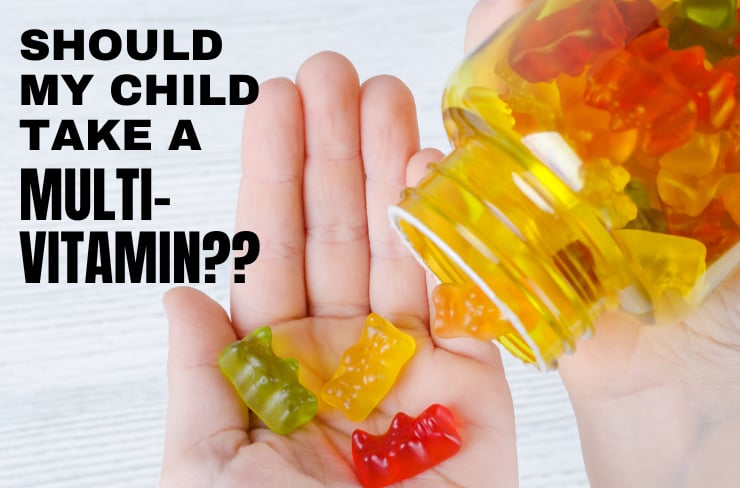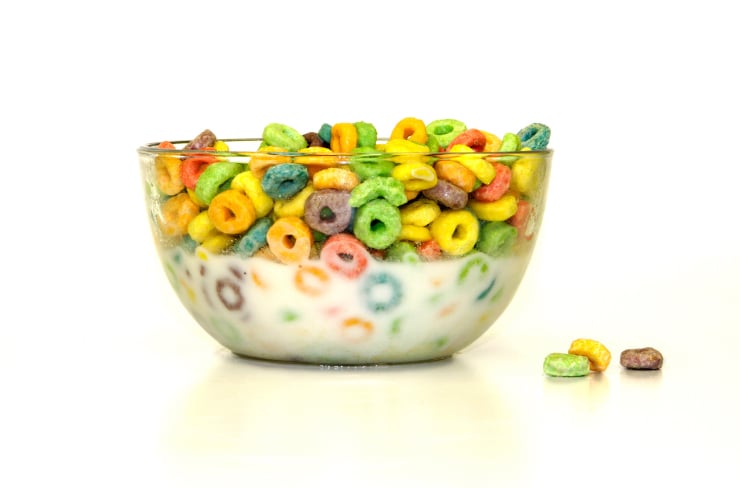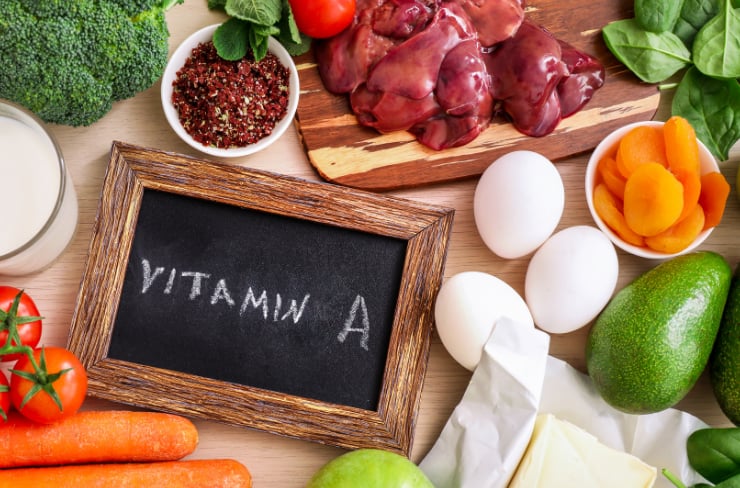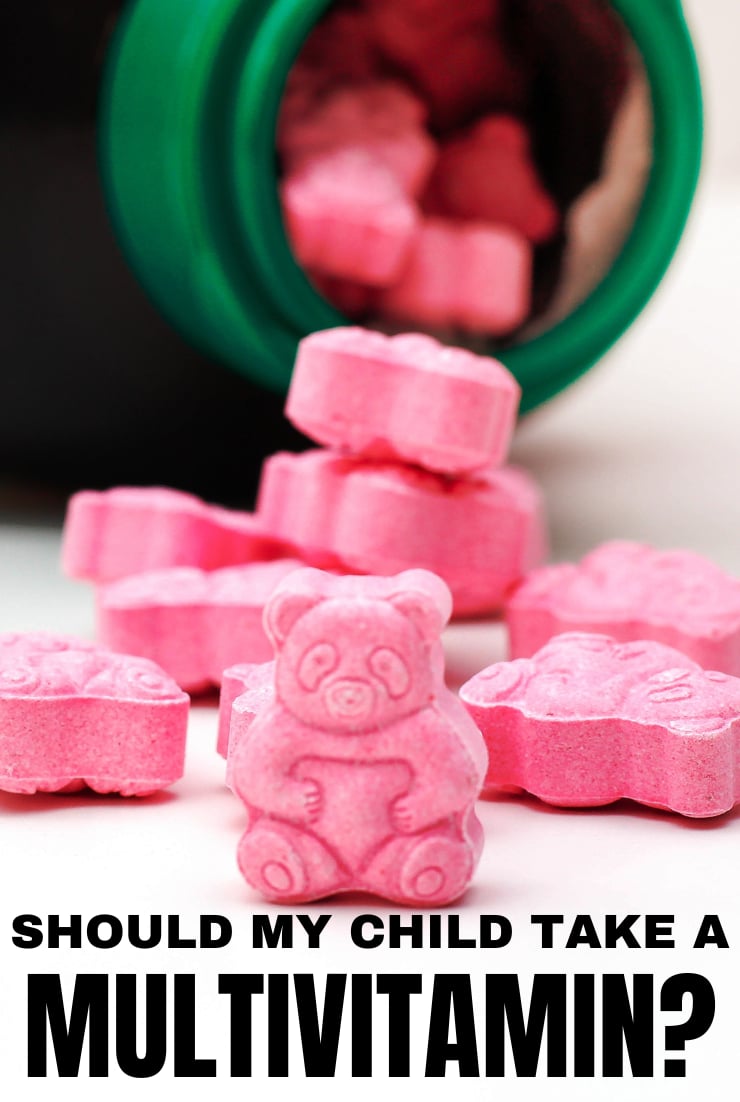If you were a child of the eighties like me, you probably took Flintstones Vitamins at some point. They were shaped like cartoon characters and tasted like candy. Plus they reassured Mom and Dad that you were getting all of your vitamins. Sounds great, right?
As processed foods were becoming more and more common, vitamin supplements were also growing in popularity.
It’s quite brilliant if you think about it.
Food manufacturers could produce cheap, lifeless food. Then add a few cheap synthetic vitamins and market the products as nutritious!

Do Kids Need Vitamin Supplements?
The cereal industry is the king of this strategy. Take cheap, GMO grains, overprocess them, add synthetic vitamins and minerals, sugar, and some food dyes – you have the ideal product to market to both parents and children. Maybe add a character to the box and a toy inside. Now they may also add fiber and a low-fat or heart-healthy stamp. Marketing genius. A highly processed food that takes up an entire aisle is a problem.
The milk industry is another big one. Confined cows are fed a slew of grains and antibiotics. The milk is is then ultraprocessed to remove the harmful bacteria. Which in essence kills the milk itself. This lifeless white water is then fortified with synthetic vitamins. Then even doctors get on board with telling parents that children should drink milk every day…low-fat of course. And while you’re at it, pair it with cereal!
If this is how a child starts each day, he or she will definitely be lacking nutrients like essential vitamins and minerals. So should kids take a vitamin supplement?

Are Vitamins Worth Taking for Kids?
It is very common for my clients to ask about a multivitamin to ensure their child is getting enough, especially if they have a picky eater.
The answer is always no.
It’s a hard answer to accept for many parents. They want that assurance, that safety net. But multivitamins for kids can actually do more harm than good.
Vitamins are considered micronutrients because we need them in smaller quantities, like milligrams instead of grams.
Vitamins are organic compounds obtained from living bodies – plants and animals. You must get them from food. They are also very fragile and heat sensitive, which means they don’t hold up well to processing.
We won’t analyze every vitamin in this post. But we’ll go through some of the most important ones.
Have you ever really looked at the label on kids’ multivitamins? There is a lot in them!

One of the first vitamins on the list is Vitamin A. Look in parenthesis. Nine times out of ten it will say beta carotene. While this is technically Vitamin A, it is not a very absorbable form since it comes from plants. It is considered pre-formed Vitamin A. The body has to take the beta carotene and convert it into retinol – the usable form. Which means if you are taking 100% of your daily value of beta carotene, you are getting far less actual Vitamin A (retinol) since the conversion is so poor.
Vitamin A is an essential nutrient. It’s most important role is assisting copper. However, it must come from animals to be effective. Which means a vegan diet is out. Cod liver oil, butter, and liver are all great options for high quality Vitamin A.
Should My Child Take A Multivitamin?
As you go down the label, Vitamin C is next. This is another crucial vitamin for both the immune system and for supporing copper regulation (in conjunction with Vitmain A).
There’s just one problem. Just as with Vitamin A, most multivitamins for kids use a non-beneficial form of Vitamin C – ascorbic acid or citric acid. These both contain only the outer shell of the Vitamin C molecule. Instead of supporting copper regulation, this will actually impede it.
Many vitamins actually come in a citrate form. They are all problematic. so whether it’s zinc citrate, potassium citrate, magnesium citrate, calcium citrate, or any other citrate or ascorbate, you’re better off avoiding it.
The best way to give your child Vitamin C is with a wholefood Vitamin C. This simply means it comes directly from food. You can do this by eating lots of fruits and vegetables. Or you can use a freeze-dried and powdered food source such as acerola or camu powder.
So far the multivitamin for kids is zero for two.

Should Kids Take a Multivitamin Daily?
As you move down the label you come to Vitamin D. Pretty much everyone has heard of Vitamin D supplements, whether you are into natural health or not.
Vitamin D is touted as a miracle cure for everything from mental health issues to the common cold.
But if you dig into the research a bit, you’ll find that there is more to the story. Vitamin D is actually a pre-hormone – a group of secosteroids. Vitamin D is synthesized by the body when sunlight hits your skin. Your body creates it. Just like your body creates estrogen, testosterone, progesterone, etc. Nobody calls those vitamins.
Excess Vitamin D will pull calcium from your bones. When analyzing Hair Tissue Mineral Analysis I can usually tell which clients have been supplementing with Vitamin D – their calcium is very high. This means their body is pulling calcium from the bones and dumping it into the tissues. Calcium hardens concrete, so imagine what it does in your tissues! Vitamin D supplements are a great option if you’re looking to slow yourself down and be arthritic.
I do not recommend Vitamin D supplements to anyone. You can read more about why HERE.

Children’s Mutlivitamin with Iron
Probably the most damaging nutrient added to many supplements for kids is iron. While this is not a vitamin, it is an essential mineral.
Iron is the most abundant mineral on the planet. We are surrounded by iron. Yet it is one of the most common minerals added to processed foods, especially grain products.
Have you looked at a cereal label recently? Chances are it has iron added. That may sound innocent. But it is literally iron shavings. Your breakfast is magnetic!
Iron becomes toxic quickly when a child does not have the co-factors to direct it. A couple important co-factors include Vitamin A from retinol (from animals) and Vitamin C (from whole foods).
If you or your child has ever been diagnosed as anemic, most of the time that’s not true. You don’t have a lack of iron. You have a lack essential vitamins and minerals putting iron where it belongs – in your blood, not in your tissues.
Iron causes oxidative stress in the body when it is not in its proper place. So skip the mulitivitamin with iron and the iron-fortified food.
What Are the Most Important Vitamins for a Child?
All vitamins are important for kids. But one of the most common vitamin deficiencies I see is B vitamins. Vitamin B is actually a complex of eight vitamins that are essentail for a host of processes in the body. These include:
- B1 (thiamine) – regulates appetite, produces energy from carbohydrates, promotes cell growth, supports nervous system/mood/mental health
- B2 (riboflavin) – deficiency causes cracks in mouth, skin irritations, tongue inflammation, sore throat, sensitivity to light; helps break down fats
- B3 (niacin) – metabolizes sugar and fat, helps skin, brain, spinal cord, sensory organs, and digestive system; deficiency causes weakness, aggression, dementia
- B5 (pantothenic acid) – deficiency causes fatigue, greying hair, numbness/tingling in limbs, supports hormone regulation
- B6 (pyridoxine) – deficiency causes water retention, supports nervous system health, blood sugar regulation, blood pressure
- B7 (biotin) – deficiency causes hallucinations, supports strength of hair and nails, breaks down fatty acids
- B9 (folate) – creation of DNA – especially important in pregnancy
- B12 (cobalamin) – break down all 3 macros, synthesis of bone marrow and nerve cells, cognitive function, cardiovascular system
The best source of all of the B vitamins is food, not supplements.

Why Your Child Does NOT Need a Multivitamin
You’ve been told that kids need to supplement nutrients, all while filling their bodies with processed, lifeless food. Food manufactureres love this strategy so much they add the vitamins for you! Then tell you it’s healthy.
Unfortunately, the vitamins added to foods and used in many multivitamins are mostly man-made, synthetic vitamins that a child’s body does not recognize. Which means they are useless. And really they are more like toxins – something for the body to expend energy removing.
As mentioned above, many vitamin supplements contain unusable or even harmful forms of vitamins. This is in addtion to extra ingredients like colors, flavors, and various forms of sugar to make the vitamins taste good.
One of the biggest problems with mutlivitamins for kids is that they create imbalance in the body. Every child has unique nutritional needs. So a generic mutlivitamin will have too much of one vitamin and not enough of another that they need. This will only make a child’s health worse.
Finally, vitamins and minerals do not work in isolation. That is why it’s important to get them through food. The food will have synergistic vitamins and minerals that help each other and are in the right balance.

What Vitamins Should My Child Take?
At the end of the day, the most important thing to know is that kids should get vitamins through real, whole foods as much as possible. This requires intentionality for parents. But eating a wide variety of proteins, complex carbohydrates with fiber, and healthy fats will give your child a solid foundation of nutrition and essential vitamins and minerals.
Due to poor farming practices our soil, our grass, our produce, and our animals are less nutritious than they used to be. So be intentional about food sourcing and quality. Growing your own food in mineral-rich soil is one of the best ways to get nutrients in your food.
Another way to ensure your kids are getting sufficient vitamins and minerals is through nutrient-dense food sources like animal products, aceraola (use code TAKE10), cod liver oil (use code Mary10), desiccated liver (use code TAKE10), bee pollen, and non-fortified nutritional yeast. These contain a lot of nutrition in a small package.
In addition to key vitamins, focus on macro-minerals like magnesium, sodium, and potassium. Minerals are just as important as vitamins.
You and your child can learn all about minerals in the Nutritional Navigation eCourse HERE!
Both vitamins and minerals are essential to your child’s health and well-being. Multivitamins for kids are not the solution. Real, nutrient-dense food is!

I haven’t kept up with your blog, but a couple of years ago I remember reading a post about Vitamin A toxicity and doing a Vitamin A detox diet. Here you mention the benefits of Vitamin A. Do you have a blog that goes into why you are promoting Vitamin A again after doing a detox?
Hi Angie,
We stopped that diet a long time ago as it was quite dangerous. I did share all about it here: https://justtakeabite.com/2020/01/06/why-we-stopped-vitamin-a-detox-diet/ I also added a disclaimer/update to all of my Vitamin A posts.
Thank you for the quick reply and for the link! I just read your post and see so much wisdom there!